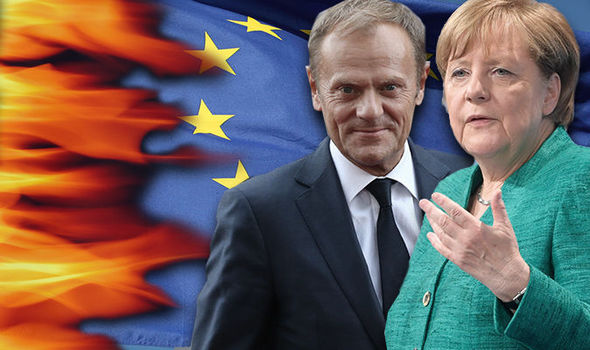We are so screwed….
Europe’s got it way worse than Trump’s America
If you think America feels slightly unstable at present, relax. At least you’re not European.

Currently, Britain is still going through the fallout from last year’s Brexit vote. A year after that shock result, Prime Minister Theresa May put herself before the public to strengthen her hand in negotiations with Brussels. In their wisdom, the British public responded by clobbering May in a general election that stripped her party of its majority in Parliament.
Meanwhile, France has just seen the first presidential election in which neither of the two main parties even made it through to the final round. Instead, the country chose young leader Emmanuel Macron, who had to form his party after being elected. All this is against the usual backdrop of a eurozone staggering from crisis to crisis and a political elite that celebrates when the far-right Austrian Freedom Party “only” receives 46 percent of the votes for the presidency.
In the midst of all this chaos, one country and one woman appear to be standing strong: Germany and its chancellor, Angela Merkel.
On Sept. 24, the Germans will go to the polls. These are the first federal elections since 2013, and quite a lot has happened since then.
The minds of German voters will be on many things. They will be thinking about how to stabilize the eurozone, the 19 EU countries that have adopted the euro as their common currency. They will also be wondering how to stop other countries from following Britain in exiting the European Union. During that process, Berlin (along with Paris) will have to pull off the double trick of persuading people that the building is not on fire and reassuring them that the fire doors are in any case jammed. But one more thing also hovers over these elections.
It is now seven years since Chancellor Merkel told her country in a speech in Potsdam that “multiculturalism has utterly failed.” It had been a mistake, she admitted, to think that the guest workers invited into the country since WWII would leave. They did not leave. They stayed. Since then, thanks to growing immigration from the developing world, parallel societies have formed in Germany. All of which was a damning, unprecedented admission by the chancellor. But then in 2015 she did something even more unprecedented and with far more damning consequences. Having admitted that mass immigration into her country had been a disaster when it had been at a relative low point, she opened up her country’s borders to bring in a historically unprecedented number of migrants.
During 2015 up to 1.5 million economic migrants and asylum seekers from Africa, the Middle East and Far East entered Germany, adding an extra 2 percent to the country’s population in just one year. Merkel’s actions spurred a crisis across the entire continent. In the days and months following her unilateral decision, she and her colleagues attempted to bully other European leaders to take on a share of the problem she had presented them with. Some supported her. Others bailed.
As I argue in my latest book “The Strange Death of Europe: Immigration, Identity, Islam,” there are specific local and historical reasons why the German chancellor did what she did in August 2015. But she also exacerbated an immigration challenge which threatens the whole future of our continent. Any culture would find it hard to accommodate the rapid movement of so many people. But for it to happen at the same time that the European continent is suffering from such a weight of historical guilt, fatigue and lack of self-belief makes it all but impossible.

